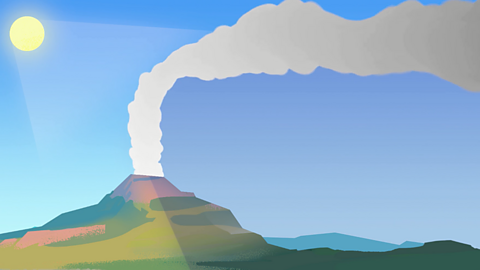Why is water important?
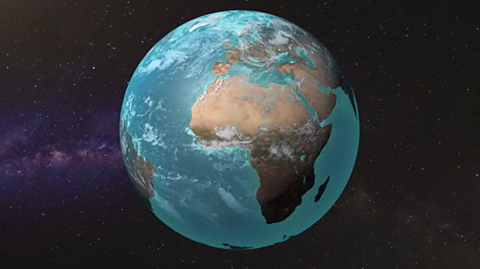
Around three-quarters of the Earth is covered in water.
Water is a valuable natural resource. It can be used to water crops and grow food, as drinking water, for washing and even for transporting goods by boat.
In the UK, there are several reservoirs that can capture and hold large volumes of fresh water. This is important for growing settlements.

What is the water cycle?
The water cycle works by using the energy of the Sun to move water from oceans and lakes to the atmosphere, and then back into the oceans again. It does this over and over in a continuous cycle.
What are the steps in the water cycle?
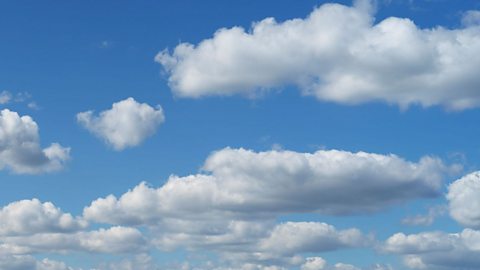
- When the Sun shines, it warms water up and turns it into a gas - water vapour. This process is called evaporation.
- The water vapour rises and collects in the sky as clouds.

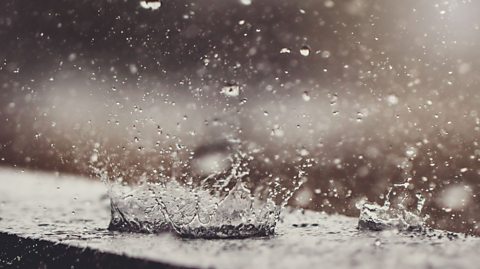
- The water vapour cools down, condenses and turns back into a liquid. It then falls back to Earth as rain, snow, hail or sleet. These are all types of precipitation.
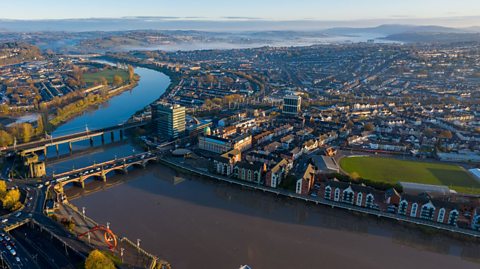
- Soils absorb the water and rivers drain the water from the land. This water is called run off. The state of the soil and the type of vegetation influence how fast and heavy the run off is.
- The water then flows back to the sea or lakes and the cycle starts again.
- Water never leaves the Earth and its atmosphere. The water we use today has been around for as long as the Earth.

Watch: The water cycle
Learn more about the water cycle in this ґуПуґ«ГЅ Teach video.
Over two thirds of the Earth is covered in water.
Water is vital to support all life on the planet.
Water never leaves the Earth and its atmosphere.
It simply moves around in what is called the water cycle.
The water cycle is the continuous journey of water from oceans and lakes, to clouds, to rain, to streams, to rivers and back into the ocean again.
When the sun shines, it causes water to warm up, turning it into a gas - water vapour.
This process is called evaporation.
The water vapour rises and collects in the sky as clouds.
When the water vapour cools down, it condenses, turning back into liquid, and falls back to earth as precipitation: rain, snow, hail or sleet.
This water then moves across land as run-off, and ends up in rivers and streams.
It then flows back to the sea or lakes and the cycle starts again.
Water moves continuously around this cycle.
The water we use today has been around for as long as the Earth.
So next time you take a drink of water, remember, it's the same water the dinosaurs drank!
Did you know?
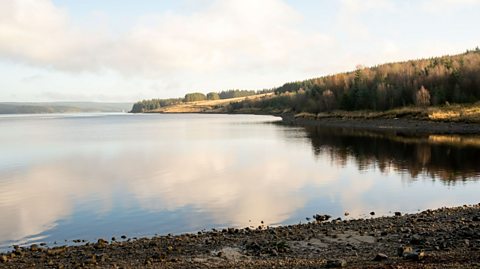
- A monsoon is a seasonal, wet and dry pattern of rain in tropical and sub-tropical regions, particularly in India and parts of South East Asia. Monsoons can involve floods and droughts.
- Different types of clouds have names. Cumulonimbus clouds are the only type of clouds that can produce thunder, lightning and hailstones.
- Kielder Water is the biggest reservoir (a human-made lake) in the UK. It is also home to England’s largest hydroelectric plant.

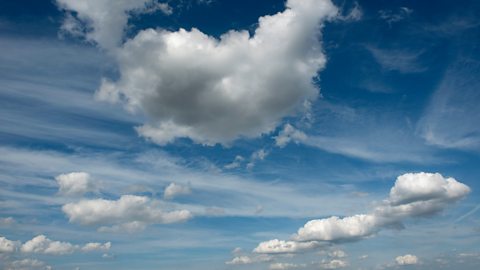
Image caption, Clouds come in all shapes and sizes - let's have a look at some of the most common kinds of clouds.
Did you know that there are lots of different kinds of clouds?
Image caption, Cirrus clouds
Cirrus clouds look like long, wispy feathers.
Image caption, Cumulus clouds
Cumulus clouds are white and fluffy - and often we can see different shapes in them!
Image caption, Stratus clouds
Stratus clouds cover much of the sky and float lower down than cirrus or cumulus clouds.
Image caption, Cumulonimbus clouds
We add 'nimbus' to the names of the clouds when there is rain or snow falling out of them. Here, rain falls from a bank of cumulonimbus clouds over the sea.
Image caption, Nimbostratus clouds
When rain is falling from a stratus cloud, we call it nimbostratus. A nimbostratus cloud looks like a dark blanket that covers the sky.
1 of 6
Watch: Lakes, lochs and reservoirs
Learn more about the lakes in this ґуПуґ«ГЅ Teach video.
De-Graft: There are more than 40,000 lakes across the UK, and what better way to explore a lake than by boat?!
This is Lake Windermere, the largest natural lake in England. It’s the same length as around 180 football pitches! Later locals Martha and Benj are going to be helping me explore all the activity that happens on the lake. But first, let’s zoom out.
Lake Windermere is part of an area called the Lake District in the north of England. The biggest lake in the UK in terms of the area covered is actually in Northern Ireland, it’s called Lough Neagh.
Lakes are large bodies of salt water or fresh water, that are surrounded by land and not part of an ocean. Compared to rivers with flowing water, lakes are slow moving and sometimes even completely still.
A reservoir is a man-made lake, rather than a natural lake like Windermere. In upland areas you often find a dam by a reservoir or a lake. It’s a large barrier that stops the flow of water and can help prevent flooding.
Lakes are an important part of the water cycle. Water warms up, evaporates and rises into the atmosphere as water vapour. When it reaches a mountain, it’s pushed up and over the peak into colder air. It condenses and turns back into a liquid, and clouds are formed. When water droplets in clouds get too heavy they fall as rain, snow, sleet or hail and this is precipitation. When rain hits the ground it either runs straight into rivers and streams, this is called surface run off, or sinks straight into the ground, this is called infiltration, or is intercepted by vegetation. The water might find its way back into a lake and the process starts again.
I’m joining Benj and Martha at the edge of Lake Windermere and I’ve set them the challenge of recording all the different activities they can spot on the lake and keeping a tally.
Oh, look. If you look out there in the distance, it looks like we’ve got some kayakers. How many kayakers can we see?
Benj: I see two, maybe three in the distance.
De-Graft: So guys, I think this is a pretty, incredible view. What do you make of it?
Martha: It’s incredible. Even living here, you never get tired of being surrounded by this much beauty.
De-Graft: It’s so incredible to know that a place like this literally exists on our doorstep. Now, what animals do you think might live around the lake?
Martha: I think there are quite a lot of otters around here. I’ve seen them here sometimes.
Benj: And some ducks and birds.
De-Graft: Yeah, those are fantastic suggestions! One animal that we haven’t mentioned yet are fish. Now this lake has loads of different species of fish, we’ve got brown trout, arctic char, white clawed crayfish and very slippery eels.
Now I’m gonna hit you two with another big fact and this one might blow your mind, ok? So, it’s said that five hundred million years ago, the Lake District was filled with volcanoes and bubbling lava. But during the ice age which happened 12,000 years ago, we had massive rivers of ice called glaciers. Now the glaciers eventually melted to create the Lakes as we know it today. What do you think of that?
Martha: For us now, seeing a frozen over lake would be incredible but a whole glacier… Boom!
De-Graft: Mind-blowing. Now guys tell me what have you spotted on your tally charts so far?
Martha: I’ve spotted quite a few sailing boats, a few swimmers and surprisingly a steamboat.
Benj: Yeah, I’ve got boats, swimmers and steamboat as well.
De-Graft: Nice. OK, time to compare… Lake Windermere holds 300 billion litres of water. That’s the same as 900 billion mugs of tea. One of the largest lakes in the world is Lake Superior, which goes across North America and Canada. It’s over 5,000 times bigger than Lake Windermere and would cover more than 60% of England.
So, what’s the biggest lake in your region? It might not be quite as big as this but I bet you can still find out some interesting facts about it. Zoom in and have a look for yourself.
Oh look, another boat.
Activity: Quiz – The water cycle
Bitesize Primary games. gameBitesize Primary games
Play fun and educational primary games in science, maths, English, history, geography, art, computing and modern languages.

More on The natural world
Find out more by working through a topic
- count1 of 16
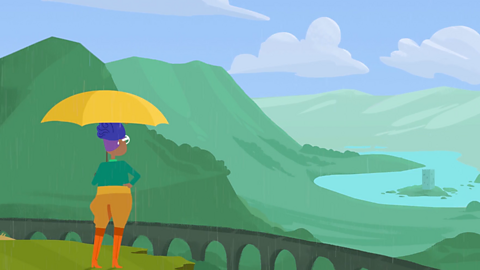
- count2 of 16
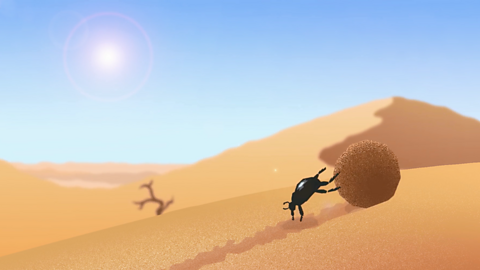
- count3 of 16
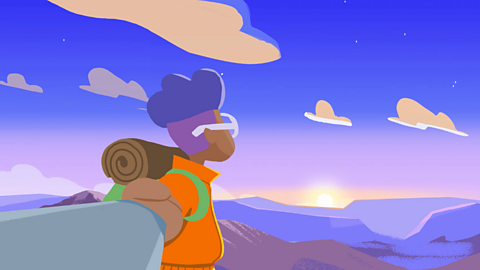
- count4 of 16
